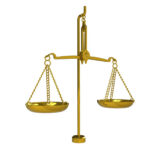The meaning of the word is ‘the agent of something’s down fall’ and this blog considers whether homeopathy is or is not a placebo. Emeritus Professor Edzard Ernst, who prior to his retirement was chair of the Department of Complementary Medicine at Exeter University, took a rather negative stance on complementary medicine and homeopathy in particular.

The biblical story of Daniel and King Belshazzar comes to mind (Daniel Chapter 5) where Daniel is summoned to interpret the words Mene, Mene, Tekel, Parsin that mysteriously have been written by a disembodied hand on the palace wall. Daniel reveals the meaning as, ‘God has numbered the days of your kingdom and brought it to an end, you have been weighed in the balances and found wanting!’. Such was the view of Prof. Ernst on homeopathy.
In order to better understand the Professor and his thinking, my second 2023 holiday read was his autobiography A Scientist in Wonderland.
You might find it surprising that I found it rather a good book.
It is not appropriate here to drill down into the detail of the scientific method. Suffice to say that given funding constraints much of the research undertaken was systematic reviews and meta-analyses of previously published work. One problem here is the quantity and quality of the original studies. When it comes to meta-analyses (indeed everything) the quality of the input sets the quality of the output.
You may also be surprised to learn that it was not until 2010 that the Homeopathic Research Institute was established. Its aims are to improve the standards of reseach and its efforts are beginning to yield results. The debate surrounding homeopathy you can find here, and the current evidence here.
Research is an expensive business and mostly in the hands of pharmaceutical companies whose commercial interests lie elsewhere. Their influence is wide, not least in medical schools.
Returning to the book, I have little doubt that Professor Ernst was a caring doctor during his long career. His first job as a physician was in a homeopathic hospital in Munich. He observed that patients got better, but by inference he clearly had suspicions that homeopathy was a placebo effect (from the Latin piacere meaning to please). A suspicion that perhaps he wished to investigate once his career focus moved to reseach work. His appointment to Exeter University brought about that opportunity.
He comes across as a principled man. His career took him across European borders (mostly Germany, Austria and the UK – plus he has a French wife) and his insights into the characteristics of each nation are most interesting. He brought to light some uncomfortably history concerning medical practice during the Nazi era. An unpopular step with some of his colleages who preferred to leave ‘sleeping dogs lie’.
I can concur with his view that there is no such thing as ‘alternative’ medicine – simply good medicine or quackery, though I do not share his conclusions.
Patient safety also is one pillar of his arguments. Could following an alternative path risk the patient’s life? This is a subject I have written on before.
Still, he might well have reflected on the level of iatrogenic disease today (from prescribed medication). The opioid crisis in America is an obvious example. Just recently questions around anti-depressants have hit the news. Dr Malcolm Kendrick writes extensively on statins. And so on..
The jest that in allopathy (orthodox medicine) one dies of the cure; in homeopathy, the disease, comes to mind!
What is really interesting here is our ability to be truly objective. Professor Ernst clearly sought to distance himself from teaching complementary medicine to students in favour of objectivity in research. The importance he attaches to this is very clear. At face value, surely worthy of plaudit?
Yet retired GP and homeopath, Dr Bob Leckridge writes this most pertinent blog. Can anyone ever be truly objective? However hard we try somewhere along the line, self gets in the way.
In another blog, Dr Leckridge pens this (you can read it in full here)
In health care we should hold this knowledge [hazard of too narrow a focus] at the core. We need to start with this individual, unique patient, today, choose the best known, most likely treatment to help them, then follow up to see how it’s worked out for them. Because no treatments produce the same outcomes for everyone, no matter whether a drug is branded “evidence based” or not. Only this individual, unique patient can tell you if the treatment is helping them.
Human beings are not machine like, and health care shouldn’t be factory like. Because every patient is unique and every doctor, nurse and therapist is unique. We need a system built on the value of keeping uniqueness at the core.
Dr Bob Leckridge

Dr Leckridge’s picture of a rose symbolises that uniquess – no two roses are the same. Living things are not like machines. A car stays a car. You, on the other hand, are dynamic; constantly changing. A mysterious combination of the material and immaterial. A data based analytical approach takes you only so far. Valuable for sure – but it is not the whole story.
We may as yet not fully understand the mechanisms of homeopathy but the homeopathic approach has a long heritage. The placebo effect is real, but insufficiently so to justify two hundred years of effective homeopathic practice throughout many countries globally.
There is a little accronym TEETH (Tried Everything Else, Try Homeopathy). That homeopathy is often the last resort and proves beneficial is a point to reflect upon.
Homeopathy may be the ‘aunt sally’ of the medical world, but placebo it is not.
Somewhere in this realm is Professor Ernst’s nemesis.